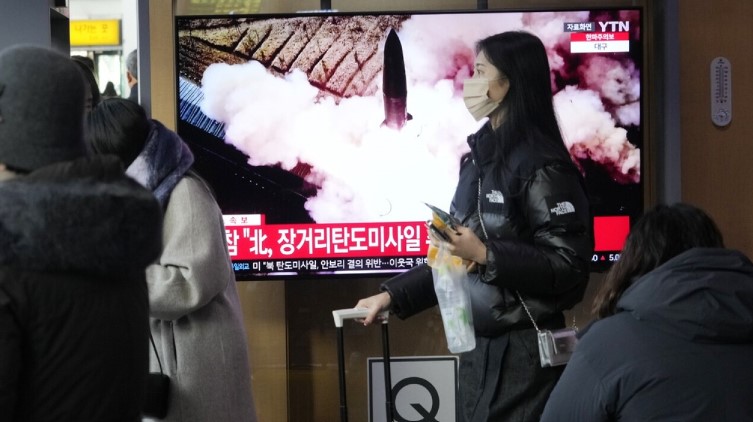In a show of continued defiance against international sanctions and pressure, North Korea fired a long-range missile into the East Sea on Monday, marking its fifth intercontinental ballistic missile (ICBM) launch this year. The missile was detected by the South Korean military, which reported that it was fired from the Pyongyang area at 8:24 a.m. local time, flying approximately 1,000 kilometers before landing in the East Sea.
The specifics of the missile’s trajectory and propulsion system are still under analysis, with the Joint Chiefs of Staff (JCS) stating that it was launched at a lofted angle and that further investigation is needed to determine its altitude and fuel type. This latest launch comes on the heels of four previous ICBM launches by North Korea in 2023, making it the highest number of such launches in a single year by the reclusive state.
The South Korean military, in cooperation with the United States and Japan, is closely monitoring the situation and sharing real-time data to bolster regional security. President Yoon Suk Yeol has ordered a joint response with the U.S. and Japan utilizing the shared data system, underlining the growing cooperation among the three countries in response to North Korea’s provocations.
The international community has condemned North Korea’s actions, with the U.S. State Department spokesperson calling for a return to dialogue while reaffirming the U.S.’ “ironclad” commitment to the defense of South Korea and Japan. The latest missile launches occurred shortly after the second session of the Nuclear Consultative Group (NCG) between Seoul and Washington, where they agreed to complete guidelines for a shared nuclear strategy by mid-next year and conduct joint military exercises simulating nuclear attacks from North Korea.
These launches also coincide with heightened tensions following North Korea’s withdrawal from a 2018 inter-Korean military agreement aimed at reducing tensions along the border. The North’s recent actions have further strained relations with South Korea, which suspended part of the agreement in response to North Korea’s successful launch of its first military spy satellite in November.
The international community continues to view North Korea’s missile launches as clear violations of U.N. Security Council resolutions prohibiting the use of ballistic missile technology. Despite repeated warnings from South Korea and its allies, North Korea’s belligerent actions persist, posing a significant challenge to regional stability and security.
(Source: Yonhap News Agency | Associated Press | Reuters)









